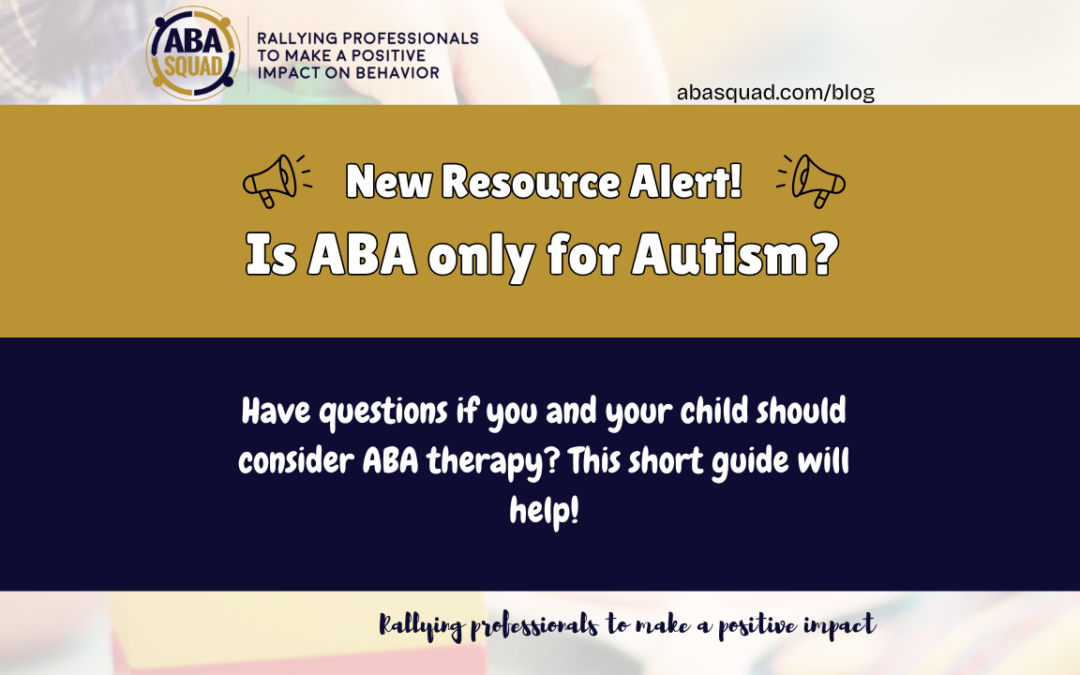Is ABA therapy only for Autism?
The Principles of ABA Therapy
Applied Behavior Analysis (ABA) therapy is a structured, evidence-based approach focused on improving specific behaviors. Its core principles include positive reinforcement, data-driven assessment, and individualized treatment plans designed to address a wide variety of learning and behavioral needs.
ABA therapy helps individuals develop essential life skills by breaking complex tasks into smaller, manageable steps. This method is frequently adapted to meet the unique needs of each individual, promoting meaningful behavior change across a variety of environments. ABA techniques emphasize positive reinforcement to increase desired behaviors and reduce problematic ones.
ABA Therapy and Autism
ABA therapy has become well-known for its success in supporting individuals diagnosed with autism spectrum disorder (ASD) and a learning disability. Many people wonder: Is ABA therapy only for autism? While it is widely used to help those with autism, ABA therapy’s applications extend far beyond this population.
How ABA Therapy Helps Individuals with Autism
For children and adults with an autism diagnosis, ABA therapy can significantly improve social interactions, communication skills, and self-care abilities. By targeting behaviors such as eye contact, conversational turn-taking, and coping with sensory sensitivities, ABA therapists create opportunities for individuals to navigate daily life with greater ease. Early intervention is particularly beneficial, helping preschool-aged children build foundational skills critical to long-term development.
Additionally, ABA therapists work with the family as well, helping to educate the team through family therapy and caregiver training.
Other Applications of ABA Therapy
While autism is a primary focus for many ABA providers, this therapy can also be applied to a wide range of conditions and challenges.
ABA Therapy for ADHD
ABA techniques can support individuals with Attention-Deficit/Hyperactivity Disorder (ADHD) by promoting organizational skills, impulse control, and problem-solving strategies. This structured approach helps improve focus and reduce hyperactivity in school and home settings.
ABA Therapy for Anxiety Disorders
Behavioral interventions within ABA can aid individuals with anxiety disorders by teaching coping strategies and reducing avoidance behaviors. Therapists often work on gradually exposing clients to feared situations in a safe, supportive environment. The goal of this therapy is to help the person work through their panic disorder without expierencing full exposure to the fear. This is similar to cognitive behavioral therapy.
ABA Therapy for Developmental Delays
Children with developmental delays can benefit from ABA therapy through skills training aimed at improving communication, motor skills, and social interactions. Treatment plans are tailored to foster progress in areas such as play, learning routines, and peer engagement.
ABA Therapy for Behavioral Issues
Individuals experiencing disruptive or aggressive behaviors can benefit from ABA therapy’s focus on identifying triggers and reinforcing positive alternatives. Board Certified Behavior Analysts (BCBAs) collaborate with families to create practical strategies that promote positive behaviors at home and in school.
ABA Therapy Providers in St. Francois County
Finding the right ABA provider is a crucial step in accessing quality care. St. Francois County, including cities like Farmington, MO, offers various options for ABA services.
Choosing the Right Provider
When evaluating ABA therapy services, prioritize providers who offer individualized treatment plans that cater to your child’s needs. Ensure they have experienced ABA therapists and a Board Certified Behavior Analyst overseeing programs. At ABA Squad, we have a local St. Francois and St. Louis, MO Team ready to provide ABA therapy alongside your family.
Questions to Ask Potential Providers
Ask about the provider’s experience working with similar cases, their approach to data collection, and how they involve families in the treatment process. Also, check if they accept your health insurance, such as Blue Cross Blue Shield.
The Benefits of ABA Therapy
The positive impact of ABA therapy extends to many areas of daily life. Here are some key benefits:
Improved Social Skills
ABA therapy teaches essential social skills, including eye contact, initiating conversations, and cooperative play. These skills can significantly enhance both peer relationships and family dynamics.
Enhanced Communication Abilities
For individuals with poor communication or language delays, ABA therapy often incorporates tools like Speech Therapy and American Sign Language to support expressive and receptive communication.
Reduction of Problematic Behaviors
By reinforcing positive behaviors and addressing underlying triggers, ABA therapy helps reduce problem behaviors such as tantrums, aggression, and self-injury. Therapists track progress using data to ensure continued growth.
Frequently Asked Questions (FAQ)
Here are answers to common questions about ABA therapy, particularly for families in St. Francois County.
Is ABA Therapy Covered by Insurance in St. Francois County?
Yes, many insurance companies, including Blue Cross and Blue Shield, cover ABA therapy for autism spectrum disorder and other developmental disabilities. It is advisable to check your specific plan and requirements.
How Long Does ABA Therapy Take to Show Results?
While results can vary, many individuals show progress within a few months of consistent therapy. Goals are typically reviewed and adjusted based on ongoing data collection.
Can ABA Therapy Be Used for Adults?
Absolutely. ABA therapy can be beneficial for adults with mental health disorders, traumatic brain injury, or those facing significant life transitions. Skills training may focus on improving daily life, relationship issues, or job performance.
Conclusion
The Versatility of ABA Therapy
ABA therapy is not limited to individuals with autism. Its principles can be applied to diverse challenges, supporting individuals of all ages in building essential skills and achieving greater independence.
Finding the right ABA provider and treatment plan is a critical step toward positive change. By asking the right questions and involving experienced professionals, families can feel confident in their journey toward a brighter future for their loved ones.







